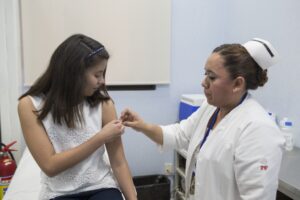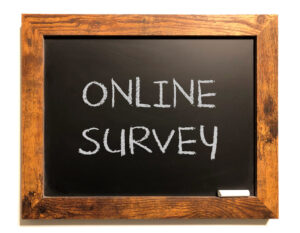COVID in the Curriculum
Benjamin Junge, associate professor of anthropology and affiliate of the Latin American and Caribbean Studies Program, is developing a COVID vaccine preparedness survey that will explore SUNY New Paltz students’ attitudes and preconceived ideas about a forthcoming COVID vaccine, in the hopes of better understanding the motives behind these beliefs.
Junge, a cultural anthropologist by training with a background in public health, specializes in Medical Anthropology, which involves “. . . looking at how culture shapes our perceptions of health and disease.” Junge’s current research focuses on perceptions of vaccines and vaccine preparedness from a cultural perspective.
He brings this focus to his classroom this fall, engaging students in his Research Methods in Anthropology, Cultures of South America and Gender and Anthropology courses in the creation of a broad-based survey, which will be administered on a voluntary basis to interested New Paltz students via the student research listserv. After review in October of public health and anthropological research on the COVID-19 epidemic, vaccines in general and vaccine preparedness, Junge’s classes began work on the survey in earnest.

According to Junge, approximately 25 percent of Americans do not favor vaccines in general and approximately 30 – 51 percent of Americans (depending upon survey data and respondent ethnicity) do not favor taking a COVID vaccine once it is available. Junge is concerned with the reasoning behind these numbers, and hopes the survey will reveal insights about how people feel and why they feel this way.
Junge stated, “From a public health perspective this is distressing because 49 percent [acceptance rate of the vaccine] is not enough to get herd immunity. It is not enough for us to return to some semblance of normal life where we are not physical distancing and wearing masks. So, the question is, why? What is going on there?”
Survey questions will focus on perceptions of the safety, importance and efficacy of the vaccine. Students in Junge’s Gender and Anthropology class will also specifically look at how race and gender influence people’s perceptions of a vaccine. For example, there may be demographic questions within the survey that provide answers to the inquiry, “Does enthusiasm for a safe and effective vaccine vary based upon ethnicity?”
Questions may also consider the ethical implications and policies surrounding vaccine implementation. Governor Cuomo recently announced New York State’s tentative plans for vaccine distribution, following CDC guidelines for addressing individuals’ risk factors including prevalence of the virus in a particular geographic area.
Junge hopes that the campus survey may inform a cultural discussion surrounding the choice of who receives the vaccine first. He explained that although a first inclination may be to want to vaccinate older people, children, and first responders, in actuality it makes most sense to first “. . . vaccinate the vectors – the ones who are most likely to infect other people.” Junge noted that in terms of a public health focus, the most vulnerable population is not always the one most likely to spread disease.

The survey may also address issues of responsibility, solidarity, American exceptionalism and other themes as they relate to vaccine preparedness. Another possible area of exploration for the survey is the question of how the anticipation of a vaccine that is not yet widely available will impact our current prophylactic practices such as social distancing and mask wearing.
Junge plans to distribute the survey to New Paltz students this November and would like to make the survey data available to the campus community in order to inform their own research. He imagines that a possible beneficiary of the dataset may be senior anthropology students working on spring capstone projects.
Junge said that utilization of the dataset to ultimately assist in “identifying obstacles or barriers to uptake of a safe and effective COVID vaccine” is a primary goal of the survey project.
